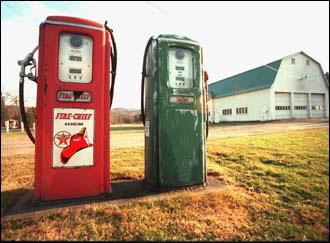Every major automaker selling cars in the U.S. has signed onto a lawsuit filed Monday aimed at halting the rollout of E15 gasoline, which has a higher proportion of ethanol (15 percent) than today's E10 gasoline.
The companies cite fears that the greater concentration of ethanol will damage engines and fuel systems. Carmakers worry that they'll be blamed for failures in cars that are running on fuel they were never designed for.
Automakers + food interests ...
The three Detroit automakers--General Motors, Ford, and Chrysler--are joined by Toyota, Honda, Nissan, and many others in the suit. Their effort echoes a similar lawsuit filed last month by a coalition of farm groups, food trade associations, and oil and gas companies.
The suits seek to overturn a rule, issued in October by the U.S. Environmental Protection Agency, approving the sales of E15 for 2007 or newer cars. Labeling and other rules are to be developed over the coming months.
... versus agriculture + alt-fuel groups
Opposing the automakers and food interests are alternative-fuel advocacy groups and corn-producing states, who have pushed for higher proportions of ethanol in gasoline.
Essentially all ethanol in the U.S. is distilled from corn, a process that yields only half as much ethanol per acre as Brazil's use of sugar cane, and just one-quarter the yield projected for cellulosic ethanol made from biomass crops like switchgrass.

gas pump
Congress requires ethanol
The Energy Independence and Security Act, passed by Congress in 2007, now requires the U.S. to consume 11.1 billion gallons of ethanol in 2010, rising to 36 billion by 2022. Many energy analysts express concerns that such a total may not be achievable, or even realistic.
Car companies have worried for years that they will suffer the blame for any failure that may be attributed to higher ethanol concentrations in gasoline. They have lobbied consistently for more detailed studies to be done using larger numbers of cars.

Old Gas Pumps
Not to worry, says study
The consulting firm Ricardo released a study in 2007 that shows higher ethanol blends posing little danger to older cars, even those built from 1994 to 2000, which are now the oldest on the road in any quantity.
Industry analysts anticipate that the EPA will ultimately approve blends up to E15 for these older cars, as more data is gathered by manufacturers and third parties. The next cohort is the pool of cars made from 2001 to 2006. That decision may come by the end of the year.
U.S. gasoline consumption, meanwhile, is projected to decline over coming years from its 2006 peak.













